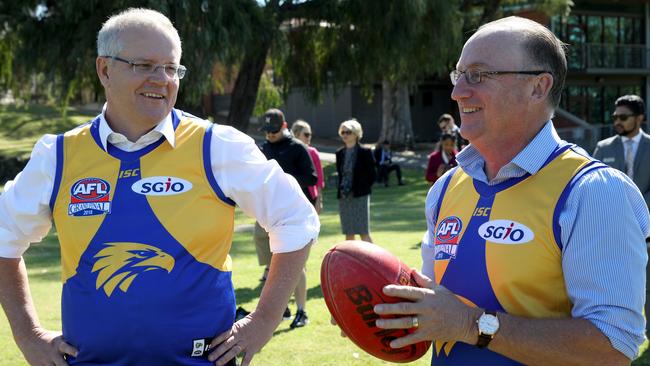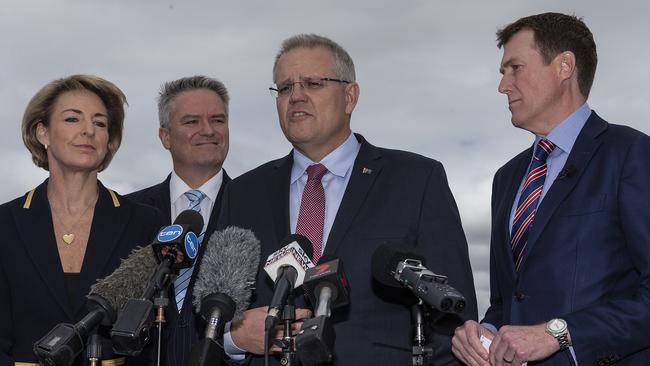GST is one taxing dilemma for government and the voters
The proposed new GST system is not robbing Peter to pay Paul but some states see it that way.

When Scott Morrison touched down in Perth this week to announce he would legislate his $9 billion GST fix, Attorney-General Christian Porter was standing symbolically close by his side.
Porter, who faces the genuine prospect of losing his outer-metropolitan seat of Pearce at the next election, knows better than anyone that the government must appease angry West Australians on the GST or face an inevitable wipeout at the polls.
The ambitious former WA treasurer has worked behind the scenes for years to convince his Liberal colleagues to deliver a bigger share of revenue from the consumption tax to his home state — a task that reached critical magnitude a few years ago when Western Australia’s GST share fell to a miserly 30c of every dollar raised.
While many on the east coast are surely fed up hearing parochial West Australian moaning about their unfair deal, few outsiders can comprehend the depth of the anger felt about the GST in a state that has endured severe economic and fiscal challenges since the resources boom ended.
And after a political brawl that has raged for 10 years, many voters — even in WA — remain confused over the intricacies of the GST and the convoluted methods used by the Commonwealth Grants Commission in carving up $70bn between the states each year.
They just want the issue to go away.
Porter’s lobbying efforts, and those of other senior West Australian Liberals, culminated three months ago when Morrison, as treasurer, unveiled his planned overhaul of the GST carve-up that would deliver an extra $4.7bn in GST funding to WA across the next eight years.
The plan represents the biggest change to the GST distribution system since the consumption tax was introduced almost 20 years ago.

Former WA premier Colin Barnett, who once threatened a Tea Party-style revolt over the GST, says he is thrilled with the outcome after years of being “ridiculed and dismissed” for standing up to Canberra.
Soon after, Bill Shorten travelled to Perth and suggested Labor was on a “unity ticket” with the government on the issue, promising he would introduce legislation within 100 days of winning government. Finally, it appeared WA had achieved the holy grail of genuine GST reform with bipartisan support.
But such joy may count for little if the Prime Minister’s bid to legislate the change is blocked when parliament resumes in Canberra this month, after the Labor Party and five state treasurers raised concerns about the fairness of the package this week.
Liberal MPs in WA will doubtless be able to blame the Opposition Leader if the government’s GST reforms fail at the final hurdle, but impatient voters in the west are just as likely to punish the government for failing to fix the issue after more than five years in power.
Porter, who holds Pearce on a margin of just 3.6 per cent, is not the only West Australian Liberal who could be unemployed on election night. Also in Labor’s sights is the eastern Perth seat of Hasluck, which is held by Aged Care Minister Ken Wyatt on an even thinner margin of 2.1 per cent, and Steve Irons’s inner-east seat of Swan (3.6 per cent).
Human Services Minister Michael Keenan is also vulnerable in his seat of Stirling, in Perth’s north, where he will be defending a margin of 6.1 per cent.
If the election result in WA is particularly bad for the Liberals, some fear prominent backbencher Andrew Hastie’s seat of Canning, south of Perth, also could fall to Labor.
Morrison’s GST plan has three key planks that will be implemented across eight years, starting in 2019-20. The first step involves Canberra handing over about $1.7bn in top-up payments to WA across three years to help lift the state’s GST share to 70c in the dollar — up from 47c this year.
Once this transition period ends, a new method for the annual GST carve-up will kick in.
The key to this new system of equalisation is that GST payments will be benchmarked to Victoria or NSW as the nation’s two most stable and broadbased economies.
This means the more volatile WA economy will never again be used as a benchmark, as it was during the mining boom.
Under the change, WA will receive about $3bn in GST revenue between 2021-22 and 2026-27, more than it would have under the old system.
In addition, a GST floor will be implemented to ensure that no state can ever again receive less than 70c in the dollar of GST, with the floor rising to 75c from 2024-25.
Morrison insists that no state will be worse off under this new system because Canberra will be injecting an extra $1bn a year into the GST pie to make it bigger. As more money flows west, he says, all other jurisdictions states will also receive more money — just not as much as WA.
“A deal does not get better than this for all states and territories when they all end up being better off as a result of the change,” he said in Perth this week.
It turns out, however, that state treasurers don’t agree. They are refusing to back the legislation unless it contains an explicit guarantee that no state will be worse off in the long term.
NSW claims the GST deal could cost the state’s taxpayers $5.5bn. Treasurer Dominic Perrottet claims Morrison’s promise that no state will be disadvantaged does not account for another mining boom, which would allow WA to keep more of the benefits for itself rather than sharing them with other states.
“If the commonwealth government is making commitments to us that no state or territory be worse off, it is only fair that it will also be enshrined in law,” he says.
“In the modelling that’s been provided by the commonwealth, in that iteration, they are correct in saying that no state is worse off.
“Having said that, there are a number of likely and probable scenarios that would result in the states being worse off.
“As a treasurer of a larger state, I accept our responsibility to support smaller states. What I don’t accept is change in the GST model which will make states worse off. We believe this legislation will do just that.”
Victorian Treasurer Tim Pallas says the GST deal is a “pure and simple political fix” aimed at shoring up seats in WA at the expense of other states, and he labels Morrison’s promise that no state will be worse off as “economic baloney”.
“All states and territories have agreed to the principle that we need these guarantees incorporated into legislation,” Pallas says.
“That’s the sort of absolute surety that we need in order to manage our budgets.
“The alternative could be financially catastrophic, and I don’t believe that the citizens of any state, or, should I say, the people who depend upon proper budget management, would see this as a fair or appropriate thing without the guarantees that have already been given being given real teeth.”
Federal opposition Treasury spokesman Chris Bowen agrees.
“Labor is deeply concerned the government’s proposed legislation fails to explicitly guarantee that no state will be worse off,” he says.
“As we review the legislation, we will seek answers about why this guarantee has been excluded.”
Those comments, reported in The Australian on Tuesday, set off a panic in the office of WA Premier Mark McGowan, who admits he was “surprised” his federal Labor counterparts were not supporting the proposed laws.
“I think there is a unity ticket — that’s what Bill Shorten told me,” McGowan says. “I think the legislation does ensure that no state will be worse off and, in fact, every state will be better off.”
Shorten maintains he will not back the new laws unless the government can guarantee all states are better off. “I don’t want to see Tasmania, Queensland, any of the other states … disadvantaged because the government is trying to chase a few votes in Western Australia,” he says.
As expected, Morrison jumped all over Shorten’s reluctance to support the bill.
“The crab-walking seems to be starting for (Shorten) when it comes to the fairer deal on the GST that WA deserves,” he says. “The only person who can derail a better deal for WA is Bill Shorten.”
It was clever politics, and talkback radio in Perth lit up with claims that Shorten was trying to walk both sides of the street on the GST and had abandoned his earlier support for WA. The West Australian newspaper ran an editorial suggesting the Labor leader was living up to his image of being “shifty”.
What some failed to comprehend, however, was that Shorten had never called for a “unity ticket” with the government on its planned overhaul of the GST distribution method or the proposal to inject additional funds into the GST pool.
He has only backed Morrison’s plan for a 75c floor.
WA Chamber of Commerce and Industry chief economist Rick Newnham says the lobby group’s modelling shows that all states will be worse off if Labor fails to back the government’s full reform package.
“Make no mistake, every state will get more GST if the federal government’s GST reform legislation passes unchanged,” Newnham says.
“The additional funding into the GST pool assures it and this has been confirmed by the independent Productivity Commission.
“Bill Shorten must end the bickering between the states and support the government in its national-interest solution.”
In the weeks ahead, Shorten will have to finally lay his cards on the table and the government may need to compromise to get its GST legislation through the Senate. Whatever the outcome, voters in WA will be watching closely, baseball bats at the ready.


